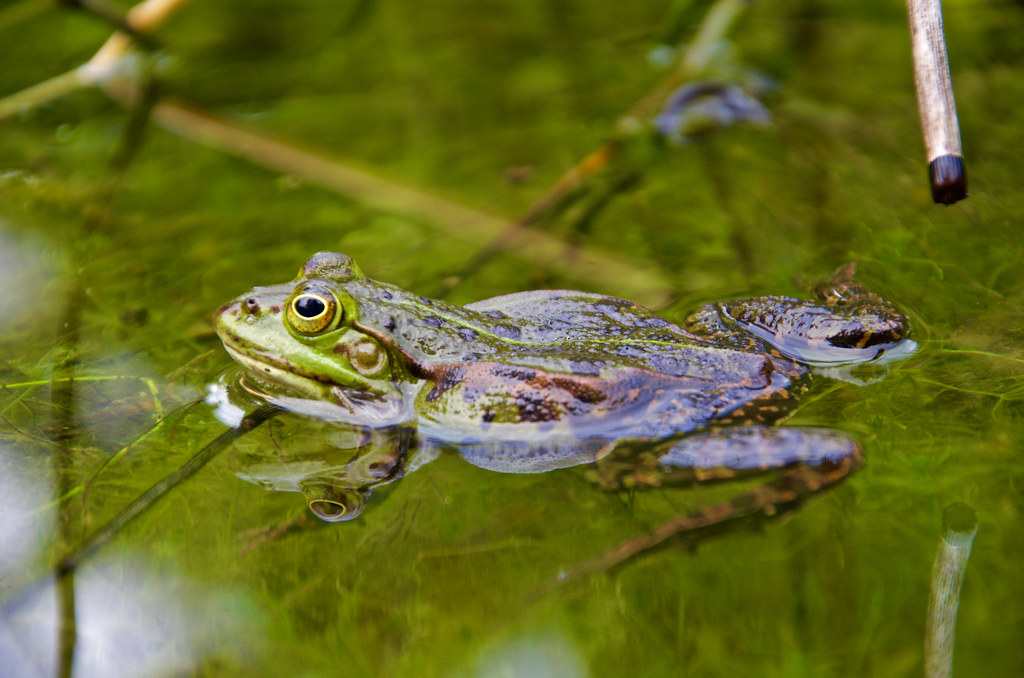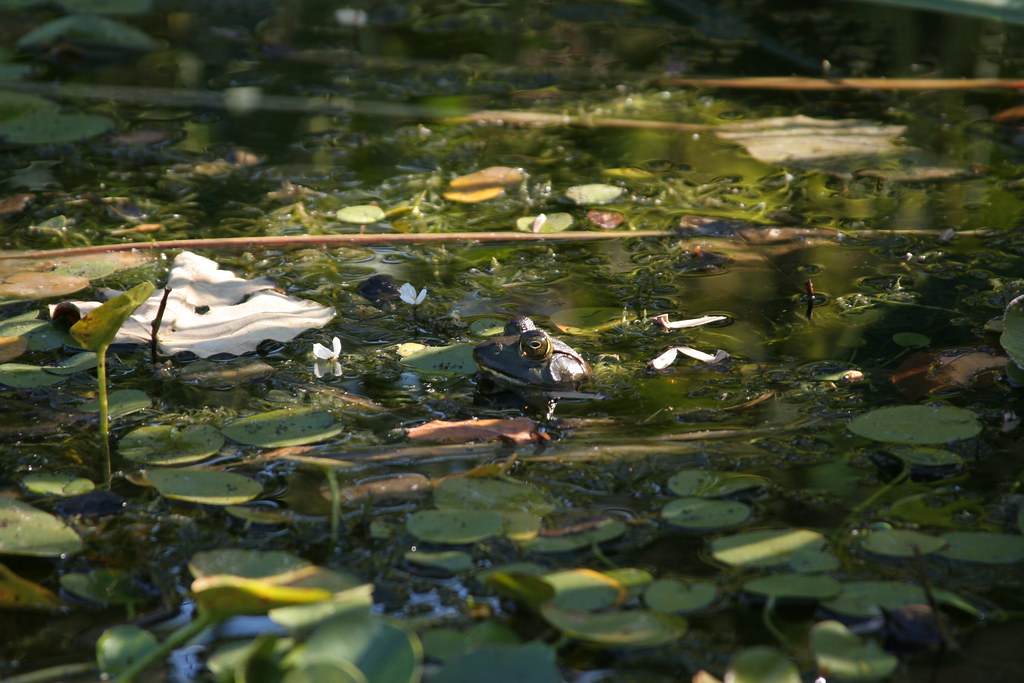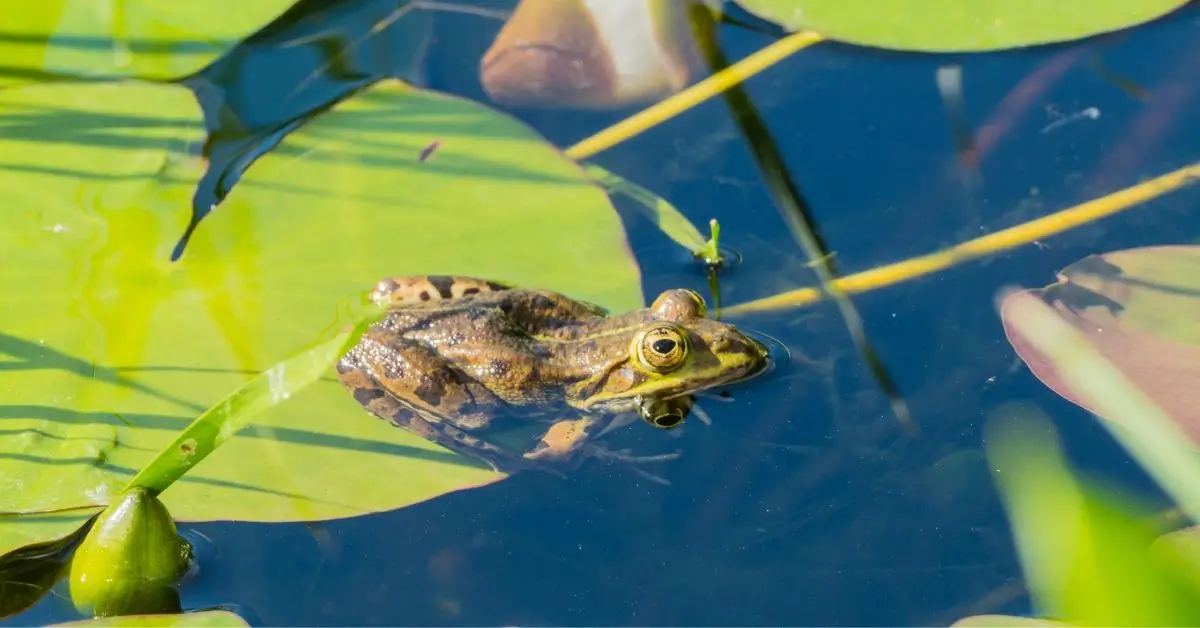It’s about that time of year when you start to see frogs jumping into your pond. Many pond owners are happy to share their space with the amphibians, but others worry that the frogs will eat all of their fish.
We all know that frogs are a great addition to any pond. They eat pesky insects and provide entertainment for the kids, but do they harm your fish? As it turns out, frogs can be helpful in a pond as long as you have an ecosystem balance.
If you have too many frogs or not enough food sources for them, they will start eating your fish. In this blog post, we’ll explore how to keep your frog population happy and healthy so they don’t become predators of your fish.
How to Keep Frogs From Eating Your Fish
If you provide the proper habitat and food sources for your frogs, they will be happy and keep themselves busy. Here are a few steps you can take to ensure that the frog population in your pond is thriving:
1. Give them a place to live and hide – If there’s nothing for the frogs to do, they will become restless. You can give them plenty of places to hide out in your pond by stacking rocks or adding fallen trees. Just make sure that the hiding spots are not so deep for the frogs that they cannot come up for air easily.
Cutter Backyard Bug Control Spray Concentrate (2 Pack), Kills Mosquitoes, Fleas & Listed Ants, 32 fl Ounce
27% OffSolar Fence Lights Outdoor - 2700/4000/6000K 3 Mode, IP65 Waterproof Fence Solar Lights Outdoor, Fence Light Solar Powered for Outside, Backyard/Railing/Step/Patio/Wall and home improvement(8 pack)
$43.88 ($5.48 / Count) (as of June 16, 2025 18:38 GMT +03:00 - More infoProduct prices and availability are accurate as of the date/time indicated and are subject to change. Any price and availability information displayed on [relevant Amazon Site(s), as applicable] at the time of purchase will apply to the purchase of this product.)SOLPEX Solar Lights Outdoor Waterproof, 12 Pack Solar Ground Lights, Solar Garden Lights Landscape Lighting for Pathway Driveway Patio Backyard Walkway (Cool White)
$37.99 ($3.17 / Count) (as of June 16, 2025 19:02 GMT +03:00 - More infoProduct prices and availability are accurate as of the date/time indicated and are subject to change. Any price and availability information displayed on [relevant Amazon Site(s), as applicable] at the time of purchase will apply to the purchase of this product.)2. Put some vegetation in – Your new frog friends will also appreciate a little greenery. Make sure to add some floating vegetation or other shallow-water plant life to your pond so the frogs have a place to eat and munch on.
3. Add a few fish – Toads and fish can live together in harmony if they both have plenty of food sources available. This may seem counterintuitive, but the frog population will stay happy if they have fish to eat. The best fish for this are smaller species that are either bottom feeders or spend their time near the water’s surface snapping up bugs.
4. Feed them – Sometimes, the frogs may need a helping hand, especially after your pond is first established. Make sure to put out some dry fish food so the amphibians have something to snack on. If you live in an area where there are large frog populations, you can also put out small amounts of freeze-dried insects every week or so.
5. Keep them healthy – When it comes to your frogs, their health is just as important as yours and mine. Make sure they always have access to clean and cool water.
6. Add some plants – Your new frog friends will appreciate a few plants in their area too. Plant lily pads, iris bulbs, and other pond plants for the frogs to eat and hide under during the day.
7. Treat them fairly – Make sure your fish get enough food but don’t forget about the frogs. They need to eat too, but not as much as your fish do.
8. Don’t overpopulate – The most important thing that you can do is make sure that you don’t overcrowd your pond with frogs. If they have too many friends, they may try to feed on your fish in order to survive.
9. Keep predators away – Of course, the best way to keep frogs from eating your fish is to make sure they can’t get to them. Maintain a clean pond, do not overstock it, and invest in some good netting for your fish ponds if you live in an area where frog populations are especially high.
While some species of frogs have been found to be major predators of fish, many species are not. Even so, it’s a good idea to keep an eye on your frog population and make sure they’re eating plenty of insects.
If you notice your fish becoming dinner for hungry amphibians, take some steps right away to change the environment in order to discourage them. By following these simple steps, you can keep your frog population healthy and happy while ensuring the safety of your fish.

How to Keep Frogs Out of My Pond?
There are several ways to keep frogs out of your pond. The easiest way is to not let them get in there in the first place: make it impossible for them, and they’ll go somewhere else.
However, if you already have a frog or two taking up residence in your pond, here are some possible solutions:
- Purchase a commercial frog barrier. There are several available on the market today, each with its own unique “frog-deterrent” feature. Some are solar-powered, while others have a sound-producing device built-in. Still, others rely on spikes to keep the frogs at bay.
- Close off any openings to your pond with a screen or netting. You can purchase screening material or fabric in rolls at many hardware stores.
- Add goldfish to your pond. Goldfish will naturally prey on frogs, as the frogs will become a source of food for their new friends.
- Purchase a frog trap. These work by trapping and killing any frogs that make their way into your pond. There are several types available on the market today, including ones that automatically kill the frog or ones you’ll have to manually dump out of after use.
- Trap the frogs yourself. This method requires a little more effort, as you’ll have to catch each frog individually, but it’s also effective as you can control how many to remove as well as when and where they die.
- Place mothballs or naphthalene balls around your pond – not inside – to discourage any frogs from coming near.
- Place some old CDs around your pond. The reflective surface of the CD will also act as a deterrent to frogs, scaring them away.
- Some people even claim that aluminum foil works too, but I’m skeptical about this one and am not sure how it would work specifically.

These are all methods that have worked for other people in the past, but be aware that any method you use to keep frogs out of your pond will probably only work temporarily.
Frogs have a very good memory, so if they even just sense your presence one day you can bet they’ll hightail it out of there right away.
Is it possible to keep goldfish and frogs in the same pond?
It is not a good idea to keep goldfish and frogs together. Goldfish are omnivorous fish, meaning that they eat both plant and animal. Frogs will sometimes come up to the surface for air and this may be when the frog gets eaten by the goldfish. When goldfish reproduce, their eggs can also sink down to the bottom of the pond where they are eaten by the frogs.
Will goldfish eat tadpoles?
Yes, some species of goldfish will eat tadpoles as well as fish eggs and some invertebrates such as stoneflies and mayflies. For this reason, it is recommended to not stock a goldfish pond with populations of amphibians.
What are the benefits of keeping frogs in a pond?
There are many benefits to keeping frogs in a pond. One of the most important benefits is that frogs eat mosquitoes and other insects, protecting you from harmful diseases.
Another benefit is that frog sounds are very calming. Some people even purchase recordings of different species of frog calls because they find them so soothing to listen to.
What kinds of frogs can I keep in my pond?
There are many different kinds of frogs that you can potentially have in your pond, but some frog species are better for ponds than others. Some examples of frogs you could potentially have include:
Gray tree frogs: These frogs are arboreal, meaning they like to climb on branches and leaves. They’re also pretty loud, which can be annoying if you don’t wish to hear the noise of frogs singing at night.
Spring peepers: These frogs are very small, only growing to be about 1.5 inches long. They are also some of the loudest amphibians in North America. You need to remember that peepers start singing as early as February and their song can be quite loud for a human listener.
Green tree frogs: These frogs are similar to the gray tree frog in that they’re also arboreal and can be quite loud.
Bullfrogs: A bullfrog is a large species of frog with big bulging eyes, being most recognized by their deep, low-pitched croak. They will eat just about anything smaller than themselves, so you need to be careful with smaller fish and invertebrates.
What kinds of frogs should I not keep in my pond?
Any frog that is a potential predator to other living things in your pond will need to be kept out. For example, don’t stock your pond with newts or any species of salamander. Some frogs that you should not stock your pond with include:
Poison dart frogs: These frogs are really colorful and bright, but they’re also one of the most poisonous species of frog in the world. In fact, they only lay their eggs in a body of water that’s very clean, otherwise, they’ll absorb contaminants from their aquatic environment which will eventually kill them.
Fire-bellied toads: These frogs have a red belly as their name implies, but they’re also voracious predators and will eat just about anything that comes within reach of their tongues. They’re not a species you want in your pond, as they can decimate populations of small fish and invertebrates.
What are some ways to entice frogs to my pond?
You can attract more frogs to your pond in several different ways. One way is by having lots of plants and shallow areas for the frogs to hide under. You can also stock your pond with bugs like beetles, snails, worms, etc. that the frog will eat. If you live in a climate that allows you to, you can even stock your pond with fish that will stay small enough for the frogs to eat.
Will frogs lay eggs in a fish pond?
Yes, In fact, I wouldn’t be surprised if you’ve found tadpoles in your pond before. However, there are some caveats and it’s really not a good idea for koi ponds.
Frogs love to lay eggs in water. They will even lay eggs directly on the base of the pond’s wall. Their eggs are adhesive and will even stick to your flesh, so it’d be wise not to pick them up with your hands.
They can also attach themselves to the bottom of a floating plant leaf or two which is why I think some people may notice an egg or two on the Lilly pads in their ponds.
If you wish to form a habitat for frogs in your fish pond, you can place some water plants inside. Some frogs will lay their eggs under the leaves of these plants and the tadpoles will develop within them.
However, if your pond freezes over in winter or is very deep with steep muddy banks, you may not want to risk placing water plants in there because sometimes the frogs will lay their eggs directly on the bottom, or they may even drown themselves trying to climb up steep banks.
So, is it bad to have frogs in my pond?
It’s not so much that having frogs in your pond is bad, but you do need to be careful about what kinds of frogs you stock your pond with. It would be best to avoid stocking the pond with any species of frog that’s a potential predator on other living things in your pond.
If you’re concerned about mosquitoes, fish such as mosquito fish can be added to the pond. These fish will eat the larvae of mosquitoes, even before they become adults.
Just remember, ponds are generally safe places for frogs since their main predators are larger animals that aren’t found in water. If you’re able to stock your pond with bugs for frogs to eat and areas where they can hide, then more frogs will likely come to your pond.
What can I feed my pet frogs?
Many kinds of aquatic plants and insects will make for a nutritious diet for your frogs. Some examples include lettuce, crickets, bloodworms, and water snails. Make sure to avoid giving them any mammalian or avian food as this can be harmful to their health. If you’re not sure what kind of food to feed your pet frog, you should ask an expert at your local fish or pet store.
Do frogs eat mosquito larvae?
Frogs will eat mosquito larvae, but they may not eliminate the mosquito population. A frog’s main diet consists of small invertebrates, but they will eat just about anything that moves and is within their reach.
Mosquitoes are one of the food sources that can sustain them during mating season or harsh winter conditions. A frog will certainly eat an adult mosquito if they’re able to catch it, but they’re not likely to be able to catch the mosquito when it’s in flight.
Summary
If you’ve been searching for a way to get more frogs in your pond, but are afraid of the noise they can make at night when singing, then this article is perfect for you.
Frogs are great creatures that eat mosquitos and other pests while making little noise during their daytime activity.
Some species of frogs can be voracious predators in your pond, so make sure to choose the right type of frog for your particular pond.
References:
Can native frogs and fish coexist in a small backyard pond? https://extension.oregonstate.edu/ask-expert/featured/can-native-frogs-fish-coexist-small-backyard-pond
How to build a simple pond for native frogs https://extension.oregonstate.edu/news/how-build-simple-pond-native-frogs
Creating Frog Friendly Landscape Ponds https://dnr.wi.gov/files/PDF/pubs/nh/nh0940.pdf















![[New Upgrade]: This new and upgraded solar in-ground light will have a longer service life and longer lighting duration than other old model [Suitable for Multiple Scenes]: Simply place these solar disk lights in your lawn, yard, patio, garden, flowe...](https://m.media-amazon.com/images/I/51gkXqCassL._SL160_.jpg)




